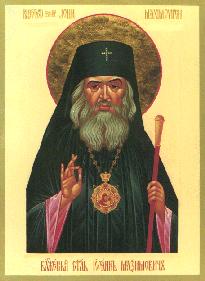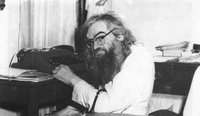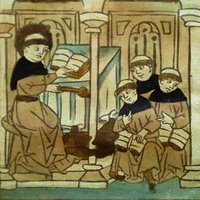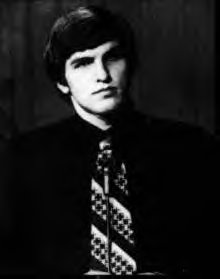Missionary Notes: The Work of Laymen in Siberia and Alaska
The story begins with the Alaskan promyshlenik [adventurer, hunter, trader], taking after his Siberian promyshlenik ancestor, becoming acclimated to his new environment, the particular region in which he happens to be working at the time. He makes friends with his fellow hunters, the local Natives. A support network of hunting companions is very important in his dangerous line of work. They all begin to work together–trapping, hunting, and trading. They work the same job for employment and sustenance. Gradually, the Russian [Russian-speaker, not necessarily ethnic Russian] becomes integrated into the Native community, a regular village fixture. He listens to his hunting buddies tell their stories of some animal "that was THIS BIG," how the village was founded, what they did when they were lost once in the wilderness as children, and how the first people came to be–all the stories which were really meaningful to them, which they wanted to share with their new friend whom they had come to know and love.
The Russian, then, tells them the stories he knows–not just about hunting, either, but all those which are meaningful to him, which he has remembered from childhood. He tells them about Russia, Russians, what they do. How can he skip mention of all the churches which dot the landscape? He tells them how the churches make the city beautiful. He tells them about monasteries and saints. The Natives sincerely enjoy the Russian's story because he tells them things they have never heard before. The promyshlenik goes on to tell his friends about the biggest celebration in Orthodox Russia–Pascha (Easter). The way this holiday is celebrated by Russians–with feasting on special foods, gatherings, music and dancing–is very much like a Native Alaskan or Siberian festival. Yet, one thing is different. The Russian has told his Native friends how, during the Paschal season, everyone in his country greets one another with the words, "Christos voskresye!" and replies, "Voistinu Voskreskye!"
The Natives look confused. The Russian translates, as best he can. His friends are still puzzled. Then the Russian, realizing the situation, tells the story of "Christos" including the "voskresye" part. He tells his friends about the crucifixion and the resurrection of Christ, then he tells them as much as he can remember about Christ's miracles, but soon he realizes that, if his friends really want to know the whole story, he may as well start at the beginning. "In the beginning," he says, and continues from there. He is not a theologian, but he knows (and tells his friends in his story) that Christ is God and that He created the world. This takes the Natives completely by surprise. They have heard and told plenty of stories about great men and miracles, but a story about God becoming man or about the creation of the world is completely unfamiliar to them, for Native Alaskans have no creation myths, only myths about human origins. The Natives ask the Russian questions and he answers to the best of his ability, but by now it has already become quite late and they have a long day of hunting to do tomorrow, so they agree to stop telling stories for the night and think about the wonderful new stories they have just told each other.
Such a lively exchange of interesting stories binds the new friends even closer together. The Russian, after a time, meets a nice Native girl and they fall in love. It so happens that she has a brother who is one of the Russian's hunting buddies and he encourages the two to get married. Yet, there is one obstacle to marriage. The Russian's intended is not a Christian and so must be baptized. As a trusted and loved friend, the promyshlenik approaches the girl's brother, his old hunting partner, with this troubling matter. "I'll talk to her," the Native hunter says. Clearly, there is no coercion here. The future Mrs. Promyshlenik receives encouragement from her brother. He tells her to listen to the Russian's stories again. She and all the Russian's Native hunting buddies and the whole village are all together one evening. She asks her intended to tell everyone the stories of his faith one more time. All the Natives listen attentively as the Russian tells his stories. They all show interest in their plot and characters and themes. The young woman is convinced she would like to be baptized and marry the Russian. Then it happens, soon afterward, that he baptizes and marries her. The couple has children and the Russian (perhaps with his wife, or perhaps she does it by herself) baptizes them in the river or the sea. The baptism, being outdoors, draws a crowd of well-wishers and curious neighbors. Perhaps there are godparents there–Russians from the area. The whole event sparks more interest in the Russian's faith and finally, perhaps beginning with his old hunting buddies who know him and his stories the best, some Natives begin to ask the Russian to baptize them. Little by little, over the years, an Orthodox community forms which will become the seed of an Orthodox parish.
The promyshlenik would have been well-equipped for explaining his faith. Even though he had no formal theological education, he carried with him plenty of visual aids to explain his faith to the Natives. For example, every promyshlenik "carried with him a metal traveling icon which would accompany him to his grave, should he die." Also, he was never without a cross hanging on a chain around his neck. These and the other things he carried with him wherever he went had great meaning for him and are evidence of his personal piety. Indeed, anyone adopting his faith and being baptized by him–from his Native wife to his children to his Native friends–would have received the same piety in following his example. Our promyshlenik, then, came to be a missionary through the course of events, not through vocation. He had never planned to preach the word of God, but, as an exchange of stories was an obligatory part of life among his new people, he offered to the them the story of his faith–something which had sustained him through the hardship, danger, and suffering of promyshlenik life. Life's difficulties had, in fact, strengthened his faith, taught him to pray, and reminded him of all the things he had been taught growing up–the sacred and secular stories of Russians. Thus, he was fully qualified to teach his wife, children, and curious friends all that he had learned. He was the one who baptized those who wished to become Christians. He was the one who built the first chapel in the village. He was the one who led the small, but growing congregation in prayer on feast days and every day. When he died, there was always someone to take his place from among those whom he had baptized and taught. Thus, the cycle continued until the arrival of the first official missionaries.
The Russian, then, tells them the stories he knows–not just about hunting, either, but all those which are meaningful to him, which he has remembered from childhood. He tells them about Russia, Russians, what they do. How can he skip mention of all the churches which dot the landscape? He tells them how the churches make the city beautiful. He tells them about monasteries and saints. The Natives sincerely enjoy the Russian's story because he tells them things they have never heard before. The promyshlenik goes on to tell his friends about the biggest celebration in Orthodox Russia–Pascha (Easter). The way this holiday is celebrated by Russians–with feasting on special foods, gatherings, music and dancing–is very much like a Native Alaskan or Siberian festival. Yet, one thing is different. The Russian has told his Native friends how, during the Paschal season, everyone in his country greets one another with the words, "Christos voskresye!" and replies, "Voistinu Voskreskye!"
The Natives look confused. The Russian translates, as best he can. His friends are still puzzled. Then the Russian, realizing the situation, tells the story of "Christos" including the "voskresye" part. He tells his friends about the crucifixion and the resurrection of Christ, then he tells them as much as he can remember about Christ's miracles, but soon he realizes that, if his friends really want to know the whole story, he may as well start at the beginning. "In the beginning," he says, and continues from there. He is not a theologian, but he knows (and tells his friends in his story) that Christ is God and that He created the world. This takes the Natives completely by surprise. They have heard and told plenty of stories about great men and miracles, but a story about God becoming man or about the creation of the world is completely unfamiliar to them, for Native Alaskans have no creation myths, only myths about human origins. The Natives ask the Russian questions and he answers to the best of his ability, but by now it has already become quite late and they have a long day of hunting to do tomorrow, so they agree to stop telling stories for the night and think about the wonderful new stories they have just told each other.
Such a lively exchange of interesting stories binds the new friends even closer together. The Russian, after a time, meets a nice Native girl and they fall in love. It so happens that she has a brother who is one of the Russian's hunting buddies and he encourages the two to get married. Yet, there is one obstacle to marriage. The Russian's intended is not a Christian and so must be baptized. As a trusted and loved friend, the promyshlenik approaches the girl's brother, his old hunting partner, with this troubling matter. "I'll talk to her," the Native hunter says. Clearly, there is no coercion here. The future Mrs. Promyshlenik receives encouragement from her brother. He tells her to listen to the Russian's stories again. She and all the Russian's Native hunting buddies and the whole village are all together one evening. She asks her intended to tell everyone the stories of his faith one more time. All the Natives listen attentively as the Russian tells his stories. They all show interest in their plot and characters and themes. The young woman is convinced she would like to be baptized and marry the Russian. Then it happens, soon afterward, that he baptizes and marries her. The couple has children and the Russian (perhaps with his wife, or perhaps she does it by herself) baptizes them in the river or the sea. The baptism, being outdoors, draws a crowd of well-wishers and curious neighbors. Perhaps there are godparents there–Russians from the area. The whole event sparks more interest in the Russian's faith and finally, perhaps beginning with his old hunting buddies who know him and his stories the best, some Natives begin to ask the Russian to baptize them. Little by little, over the years, an Orthodox community forms which will become the seed of an Orthodox parish.
The promyshlenik would have been well-equipped for explaining his faith. Even though he had no formal theological education, he carried with him plenty of visual aids to explain his faith to the Natives. For example, every promyshlenik "carried with him a metal traveling icon which would accompany him to his grave, should he die." Also, he was never without a cross hanging on a chain around his neck. These and the other things he carried with him wherever he went had great meaning for him and are evidence of his personal piety. Indeed, anyone adopting his faith and being baptized by him–from his Native wife to his children to his Native friends–would have received the same piety in following his example. Our promyshlenik, then, came to be a missionary through the course of events, not through vocation. He had never planned to preach the word of God, but, as an exchange of stories was an obligatory part of life among his new people, he offered to the them the story of his faith–something which had sustained him through the hardship, danger, and suffering of promyshlenik life. Life's difficulties had, in fact, strengthened his faith, taught him to pray, and reminded him of all the things he had been taught growing up–the sacred and secular stories of Russians. Thus, he was fully qualified to teach his wife, children, and curious friends all that he had learned. He was the one who baptized those who wished to become Christians. He was the one who built the first chapel in the village. He was the one who led the small, but growing congregation in prayer on feast days and every day. When he died, there was always someone to take his place from among those whom he had baptized and taught. Thus, the cycle continued until the arrival of the first official missionaries.








0 Comments:
Post a Comment
<< Home